Do you find yourself constantly filling up your feline’s food bowl, only to see them remain skinny and always begging for more? If so, you’re not alone. Many cat owners struggle with the challenge of a seemingly insatiable and underweight kitty. But fear not, in this blog post, we’ll dive deep into the possible reasons behind this behavior and provide some helpful tips for managing their appetite.
First things first, it’s essential to understand that cats naturally have a high metabolism that burns calories quickly. Plus, their innate hunting instincts drive them to graze throughout the day, even if they’re not actually hungry. However, if your cat is always hungry despite eating regularly, it could be a sign of an underlying health issue such as hyperthyroidism or diabetes.
Another crucial factor to consider is the quality of your cat’s food. If they’re consuming low-quality or high-carb diets regularly, they may not be getting all the necessary nutrients to keep them feeling full and satisfied. Additionally, if you’re free-feeding or giving them too many treats and table scraps, they may be overeating without realizing it.
So what can you do about it? Firstly, consider switching to a high-quality cat food that is rich in protein and will keep your furry friend full for longer periods. It’s also crucial to regulate their feeding schedule and avoid free-feeding to prevent overeating. Regular exercise and playtime can also help improve their metabolism and manage their appetite.
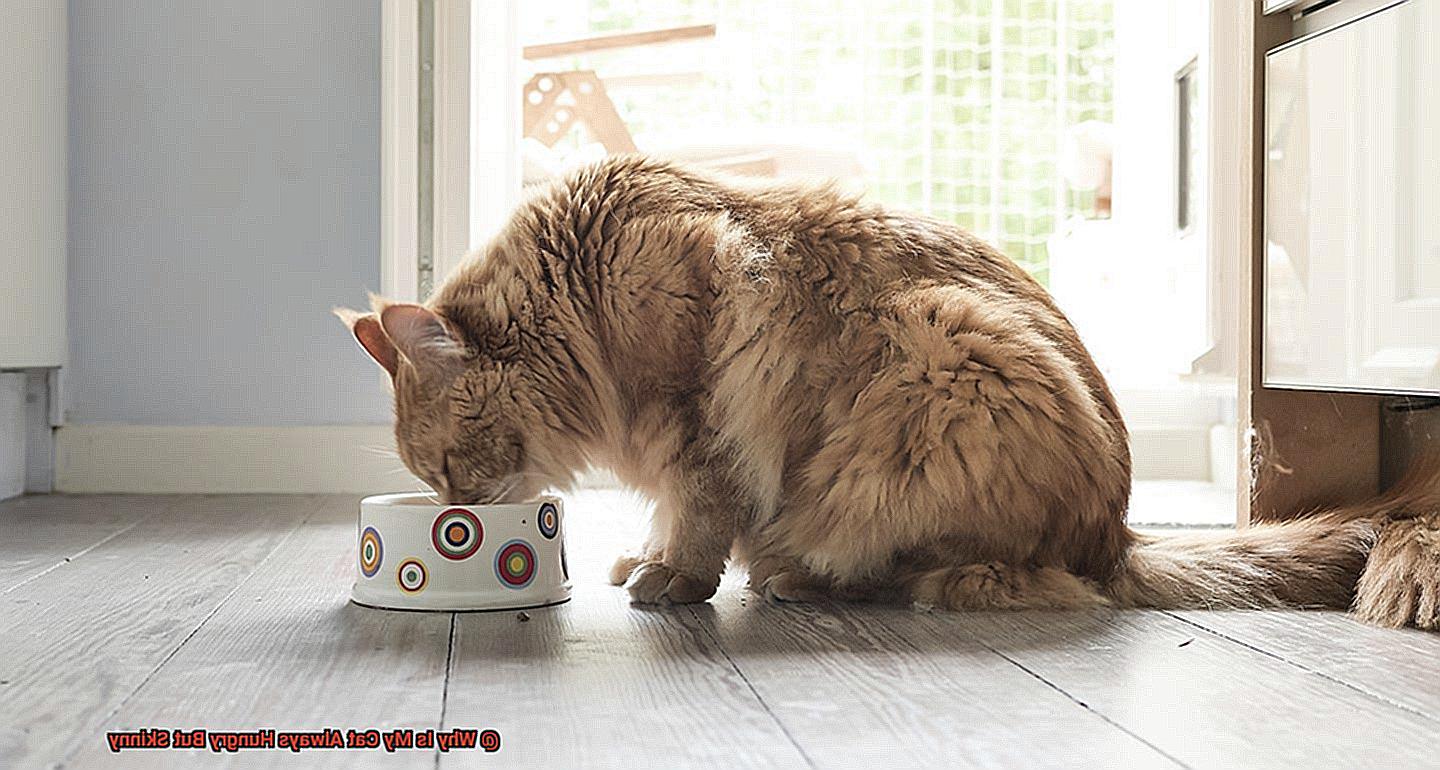
In conclusion, by understanding the causes behind your cat’s constant hunger and implementing solutions like these tips mentioned above can help manage their appetite while keeping them healthy and happy. So say goodbye to those endless meows for more food and hello to a contented kitty who loves life.
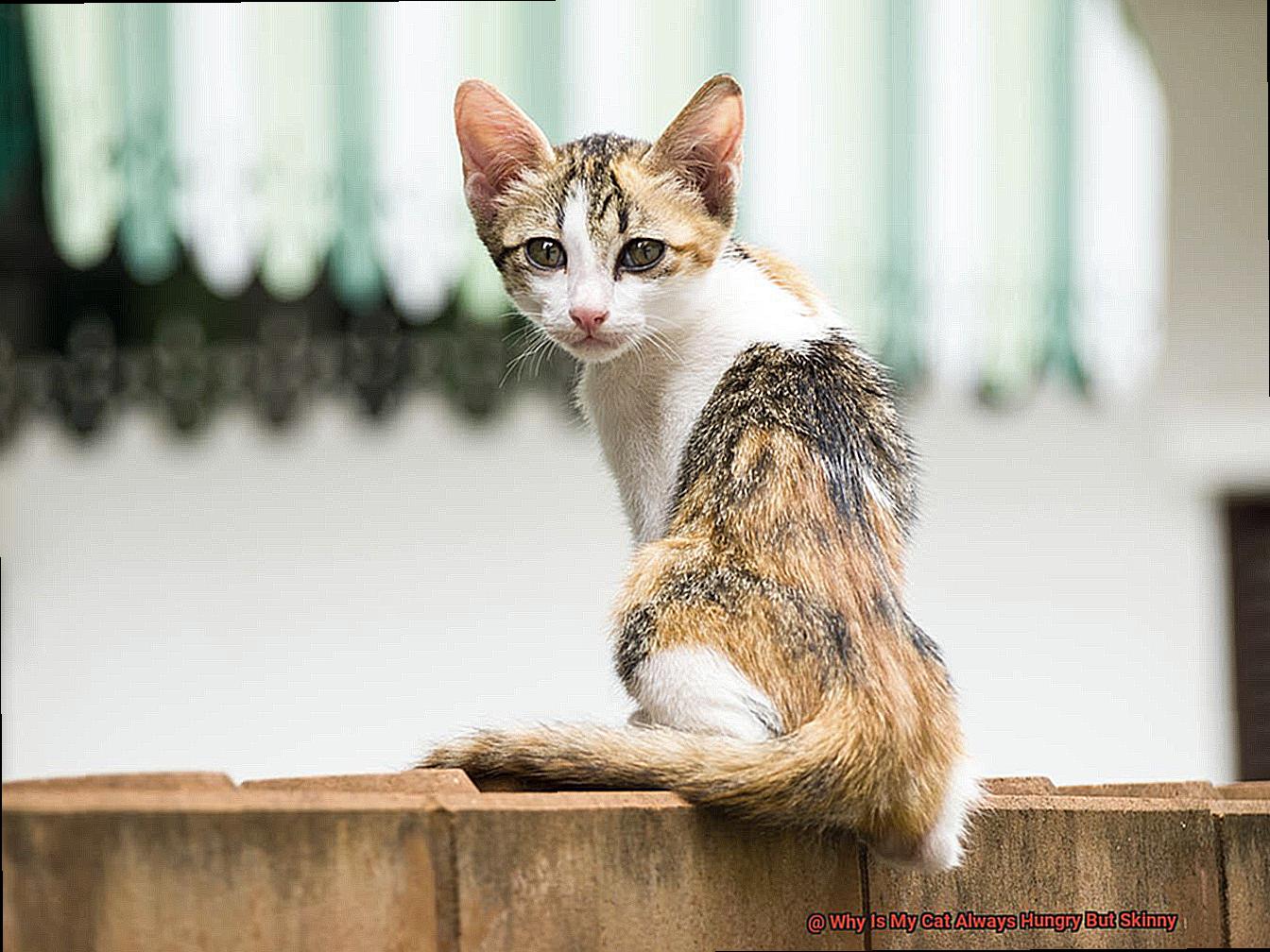
What Causes a Cat to be Always Hungry But Skinny?
It’s important to note that this behavior can be a sign of an underlying health issue, so let’s explore some possible causes.
One of the most common reasons for constant hunger in cats is a high metabolism. Some felines just burn calories at a faster rate than others, which means they need more food to maintain a healthy weight. However, if your cat is eating more but still losing weight, there may be other factors at play.
Intestinal parasites are another potential cause of excessive hunger and weight loss in cats. These pesky parasites can disrupt nutrient absorption, leading to increased appetite and malnutrition. That’s why it’s crucial to have your cat checked for parasites regularly by your vet.
Hyperthyroidism is another condition that can cause increased appetite and weight loss in cats. This occurs when the thyroid gland produces too much hormone, which speeds up the cat’s metabolism and causes them to burn calories faster than they can consume them. If you suspect this may be the case, it’s important to get your pet checked by a vet.
Stress and anxiety can also lead to excessive hunger in cats. Changes in their environment or routine, such as moving or introducing a new pet, can cause stress and lead to increased hunger. This is why it’s essential to provide your feline with a comfortable and stable environment.
It’s important to note that some cats may have an underlying medical condition that is causing them to lose weight and have an increased appetite. Diabetes and inflammatory bowel disease (IBD) are two examples of conditions that can cause these symptoms. If you notice any changes in your cat’s eating habits or weight, it’s best to consult with a veterinarian.
In conclusion, there are several reasons why a cat may be always hungry but skinny. As a responsible pet owner, it’s vital to monitor your cat’s eating habits and seek veterinary care if you notice any changes in their behavior or weight.
High Metabolism
Don’t worry, it could simply be a case of high metabolism. Just like humans, cats have a metabolic rate that determines how fast they burn calories. Some cats may have a higher metabolic rate than others, which means they need to consume more food to maintain their weight. If their food intake is not enough to support their high metabolism, this can lead to constant hunger and weight loss.
Certain breeds of cats, such as Siamese and Bengal cats, are known to have a naturally high metabolic rate. This means they require a higher calorie intake compared to other breeds to maintain their weight and energy levels. So if you happen to have one of these breeds, don’t be surprised if they always seem to be on the lookout for their next meal.
However, it’s important to note that sometimes there could be underlying health issues that contribute to a cat’s high metabolism and constant hunger. For example, hyperthyroidism is a common condition in older cats that causes an overactive thyroid gland and increased metabolism. This can lead to weight loss despite increased appetite.
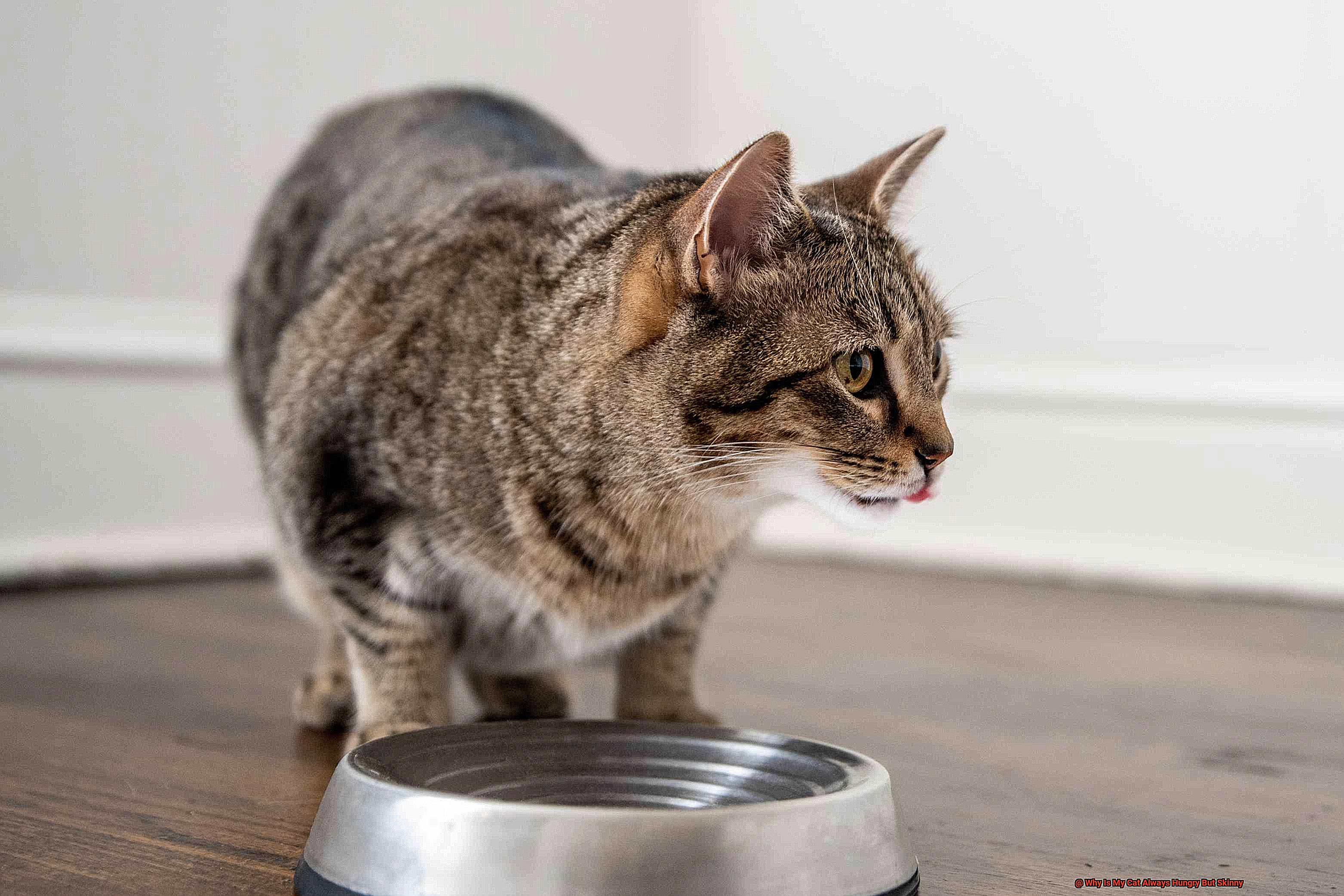
If you suspect your cat’s constant hunger is due to a high metabolism or potential health issues, it’s best to consult with your veterinarian. They can assess your cat’s overall health and provide appropriate recommendations for their diet and any necessary medical treatment.
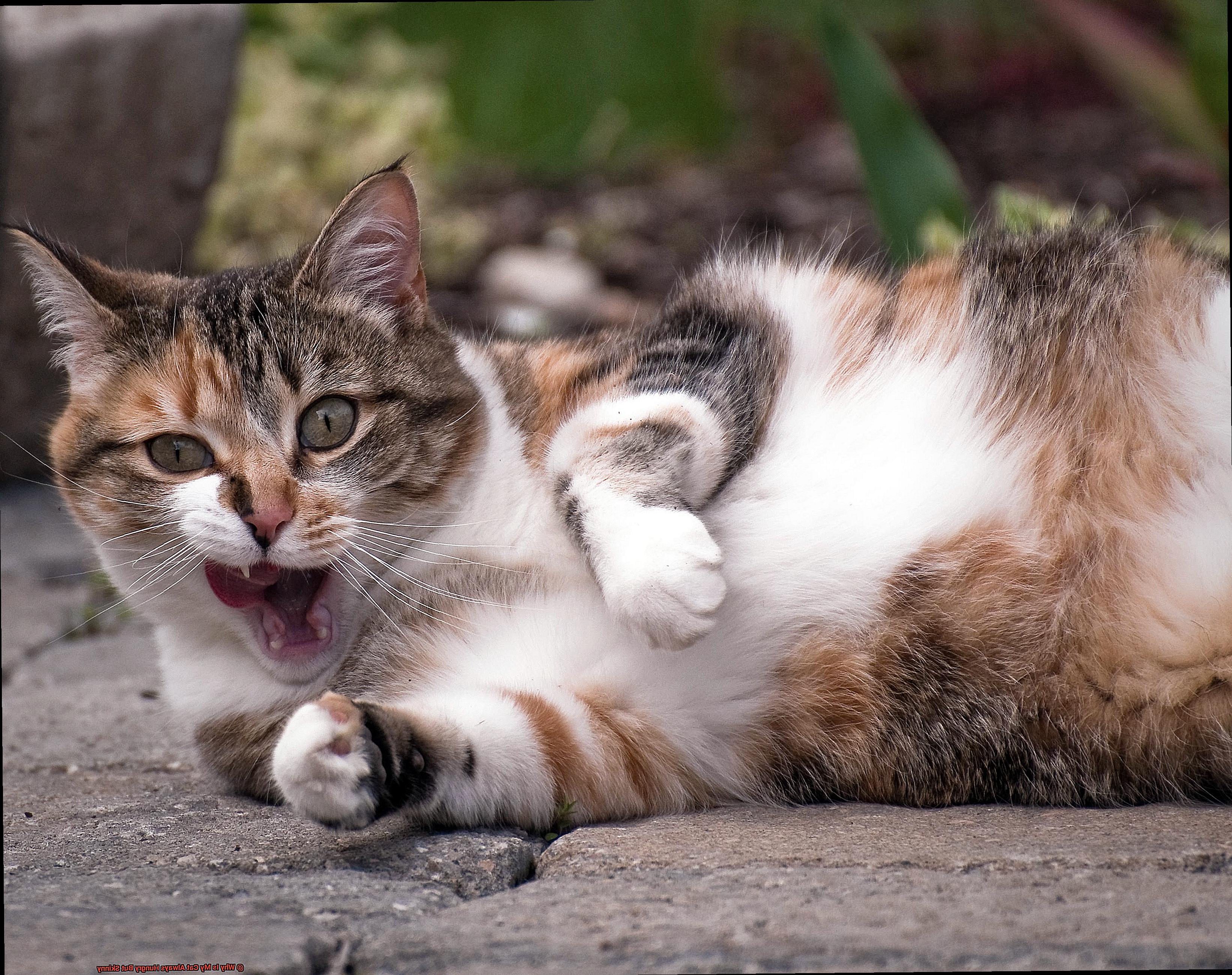
Intestinal Parasites
Unfortunately, intestinal parasites are a common health issue that affects cats. These unwelcome guests, including tapeworms, roundworms, and hookworms, can lead to a range of symptoms in your beloved feline such as diarrhea, vomiting, lethargy, and even a bloated belly.
If you suspect that your cat may have intestinal parasites, don’t panic but do take them to the vet for a proper diagnosis and treatment plan. Your vet may prescribe deworming medication that will effectively get rid of the pesky parasites. Depending on the severity of the situation, your cat may need multiple treatments.
However, prevention is always better than cure. There are simple measures you can take to keep your cat safe from these parasites. Firstly, make sure to keep your cat’s litter box clean and dispose of feces properly. Secondly, avoid feeding your cat raw or undercooked meat as this can be a source of contamination. Finally, it’s crucial to ensure that your cat’s food and water sources are always clean and free from contamination.
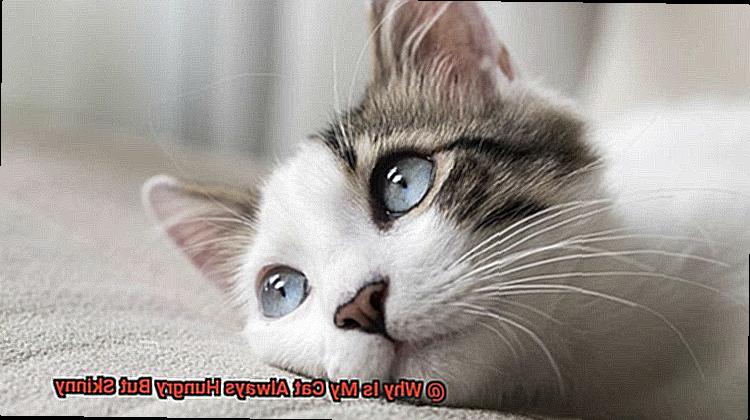
Regular veterinary check-ups are also essential to detect any potential parasite infections early on. Remember, if left untreated, intestinal parasites can cause severe damage to your cat’s intestinal tract and lead to malnutrition.
In conclusion, it’s essential to be vigilant when it comes to intestinal parasites in cats. Keep an eye out for any symptoms and take action quickly if you suspect that your cat may have intestinal parasites.
Hyperthyroidism
Hyperthyroidism is a common condition that can affect cats of all ages, but it’s more prevalent in older cats and females. It occurs when the thyroid gland, located in the neck, produces too much thyroid hormone. This excess hormone speeds up the cat’s metabolism, causing them to burn calories at an accelerated rate. As a result, cats with hyperthyroidism may appear constantly hungry but still lose weight.
The symptoms of hyperthyroidism are varied and can include increased appetite, weight loss, increased thirst and urination, vomiting, diarrhea, hyperactivity, and aggressive behavior. If you suspect your cat has hyperthyroidism, it’s essential to seek veterinary care immediately to prevent any further complications.
Diagnosis of hyperthyroidism can be made through blood tests that measure thyroid hormone levels. Treatment options include medication to regulate the hormone levels, surgery to remove the affected gland, or radioactive iodine therapy.
It’s crucial to work closely with your veterinarian to manage your cat’s hyperthyroidism and keep them healthy and happy. Left untreated, this condition can lead to serious health problems such as heart disease and high blood pressure.
Preventative measures such as regular veterinary check-ups, avoiding raw or undercooked meat, and proper disposal of feces can help reduce the risk of hyperthyroidism in cats.
Stress and Anxiety
While hyperthyroidism may be a possible cause, stress and anxiety can also play a significant role in your cat’s unusual eating habits.
Stress and anxiety can make cats turn to excessive eating as a way to cope with their overwhelming emotions. This is because food releases “feel-good” hormones that help reduce feelings of stress and anxiety. However, overeating can lead to weight gain and other health issues.
Identifying the root cause of your cat’s stress or anxiety is crucial in addressing this issue. Changes in the household such as the arrival of a new pet or family member, moving to a new home, or loud noises like fireworks or thunderstorms can trigger such feelings in cats.
If you suspect that your cat’s increased appetite is due to stress or anxiety, creating a more calming environment for them is essential. You could consider providing more playtime and exercise or consulting with your veterinarian about medication options.
In addition to addressing the underlying stress or anxiety issue, monitoring your cat’s diet and feeding habits is equally important. Maintaining a consistent feeding schedule and practicing portion control can help prevent overeating and maintain a healthy weight.
Remember, if you’re concerned about your cat’s eating habits, it’s always best to consult with your veterinarian.
Underlying Medical Conditions
While some felines have faster metabolisms and are naturally more active than others, persistent hunger and weight loss may be symptoms of an underlying medical condition. Here are some potential culprits:
Hyperthyroidism
This common hormonal disorder occurs when the thyroid gland produces too much thyroid hormone, which can increase metabolism and appetite while decreasing weight and muscle mass. Other symptoms may include restlessness, increased thirst and urination, vomiting, diarrhea, and hyperactivity. A simple blood test can diagnose hyperthyroidism, which can be managed with medication, diet, or surgery.
Diabetes mellitus
This metabolic disorder occurs when the body is unable to regulate blood sugar levels due to a lack of insulin production (type 1) or insulin resistance (type 2). Excessive eating and drinking, weight loss, lethargy, dehydration, urinary tract infections, and nerve damage are common signs of diabetes in cats. Blood and urine tests can diagnose diabetes in cats, which can be treated with insulin injections, dietary changes, weight management, and monitoring.
Inflammatory bowel disease
This chronic condition occurs when the immune system overreacts to the presence of certain proteins or bacteria in the digestive tract, leading to inflammation and damage to the intestinal lining.
Common signs of IBD in cats may include vomiting, diarrhea, weight loss, loss of appetite or interest in food, lethargy, and abdominal pain or distension. Diagnosis typically involves blood tests, fecal analysis, imaging studies, endoscopy or biopsy. Treatment options for IBD in cats may involve dietary changes, medications, or supplements.
Chronic kidney disease
This progressive condition occurs when the kidneys are unable to filter waste and fluids from the blood properly, leading to a build-up of toxins and electrolyte imbalances.
Common signs of CKD in cats may include increased thirst and urination, weight loss, poor appetite or vomiting, lethargy, bad breath, dehydration, and changes in behavior or grooming habits. Diagnosis typically involves blood tests, urine tests, imaging studies, and/or biopsy.
Treatment may involve dietary changes, medications to manage symptoms or slow down the progression of the disease.
Signs and Symptoms of Weight Loss in Cats
It could be a sign of weight loss, which is often linked to underlying health issues. As a responsible pet owner, it’s essential to keep an eye out for any signs of weight loss in your feline friend.
One of the most obvious signs is visible bones, such as the ribs, spine, or hip bones. Additionally, a loss of muscle mass could make your cat appear thin and lanky with little muscle tone. They may also seem less active and have less energy than usual, making them lethargic.
Other symptoms to look out for include changes in appetite, such as decreased appetite or a complete loss of appetite. Your cat may also vomit or have diarrhea more frequently than usual. Changes in water intake or urination frequency are also possible symptoms. Additionally, their coat may become dull and lackluster, and their skin may become dry or flaky.
It’s crucial to keep a close eye on your cat’s behavior and overall appearance to catch any signs of weight loss early on. If you notice any of these symptoms, it’s essential to take your cat to the vet for a check-up immediately. Early diagnosis and treatment can prevent further health complications and ensure a happy and healthy cat.
While it’s easy to assume your cat is just being picky, weight loss could indicate an underlying medical condition such as hyperthyroidism, diabetes mellitus, inflammatory bowel disease, or chronic kidney disease.
The Importance of Monitoring Your Cat’s Eating Habits
One of the most crucial aspects of their well-being is monitoring their eating habits. By paying close attention to what and how much your cat eats, you can ensure they receive the proper nutrition to stay healthy and active.
But why is monitoring your cat’s eating habits so important? For starters, it can help detect any underlying health issues early on. If your cat seems hungry all the time but still skinny, this could be a sign of hyperthyroidism or diabetes. By keeping track of their appetite and weight, you can catch these conditions before they become more serious.
Besides medical concerns, monitoring your cat’s eating habits can also help prevent obesity. Overfeeding and a lack of exercise can lead to weight gain in cats, increasing their risk for heart disease and joint issues. By tracking the amount and type of food they consume, as well as their activity levels, you can help prevent obesity, ensuring they maintain a healthy weight.
So how do you keep tabs on your cat’s eating habits? Start by noting their feeding schedule and portion sizes. Make sure they receive the appropriate amount of food for their age, weight, and activity level. Also, pay attention to any changes in their appetite or water intake. If you notice significant changes, consult your vet for a check-up.
Overall, monitoring your cat’s eating habits is vital in maintaining their overall health and happiness.
vAwd-SH0RI0″ >
Conclusion
To wrap things up, a cat who always seems to be hungry but remains skinny could be a sign of an underlying health issue. While it’s possible that your feline friend has a high metabolism or grazing instincts, it’s essential to keep an eye out for any other symptoms that may indicate something more serious, such as hyperthyroidism, diabetes, inflammatory bowel disease or chronic kidney disease. Stress and anxiety can also lead to overeating in cats.
To help your cat maintain a healthy weight and manage their appetite, consider switching to a high-quality cat food that is rich in protein and avoid free-feeding. Regular exercise and playtime can also help improve their metabolism while providing them with a stable environment can reduce stress levels.
It’s worth noting that early diagnosis and treatment of any underlying medical conditions are crucial in preventing further health complications. Therefore, scheduling regular check-ups with your veterinarian is necessary to detect any potential parasite infections early on.
In summary, by understanding the possible causes behind your cat’s constant hunger and implementing solutions like the tips mentioned above can help manage their appetite while keeping them healthy and happy. So keep monitoring your furry friend’s eating habits closely and seek veterinary care if you notice any significant changes in their behavior or weight.

